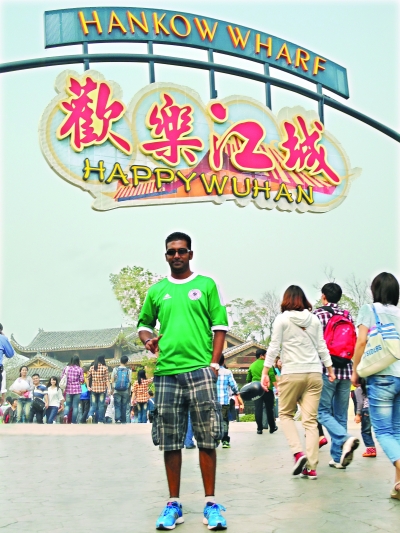
Name: NIVED MOONASAR
Nationality: Trinidad and Tobago
Major: Ophthalmology (Tongji Medical College, Huazhong University of Science and Technology)
Coming from an island in the Caribbean, Nived Moonasar traveled a long way, across the Caribbean Sea and the Pacific Ocean, to further his education here in Wuhan. His arrival in Wuhan marked his first visit to China, and to Asia for that matter. The life here is completely different, but he is enjoying the unique change of pace. He is also doing his part to promote cross-cultural exchange.
The only Trinbagonian living in Wuhan
Nived was born in Trinidad and Tobago, an island country in the Caribbean, a region that lies north of South America. It is a 30-hour flight to China from Trinidad and Tobago. "My country is probably the most multi-cultural island in the world. The original inhabitants were the American Indians; then the Spanish came after Columbus 'discovered' the Americas, then the Portuguese came, then the French, then the Dutch, some Germans, and then eventually the British. My ancestors came from Asia more than 200 years ago; after African slavery was abolished, the British brought Chinese and Indian indentured servants to Trinidad to work on the sugarcane plantations. Nobel Peace Prize winner Archbishop Desmond Tutu of South Africa described us as 'rainbow people' on his visit to my country, because he was impressed by how multiethnic we are," said Nived.
Nived was awarded a Chinese scholarship to pursue postgraduate studies in ophthalmology, after completing his undergraduate medical degree in his hometown. His first choice was Hong Kong. However, Yang Youming, the Ambassador of China to Trinidad and Tobago at that time, suggested that he go to Wuhan, to Tongji Hospital, one of the best hospitals in Central China. Nived accepted his suggestion, and was eager to embark on a journey to this city which was unknown to him at the time. He is now the only citizen from Trinidad and Tobago living in Wuhan.
According to Nived, China was one of the first countries to recognize Trinidad and Tobago after its independence from the UK in 1962. In 1974, the People's Republic of China and Trinidad and Tobago formally established diplomatic relations. At the end of this year, the Embassy of Trinidad and Tobago in China will be officially set up in Beijing. As the only Trinbagonian in Wuhan, Nived plans to attend the opening ceremony in Beijing and is eagerly anticipating this new development.
Encouraging cross-cultural exchange
Nived arrived in Wuhan last September and began his three-year Ophthalmology Program at Tongji Hospital. His professor, Sun Xufang, is an expert when it comes to diseases that affect the eyes. The focus of Nived and Dr. Sun's research is the removal of diseased portions of the eye, areas that have been affected by illnesses like diabetes, and the application of medicine to the retina to prevent patients from going blind. Nived mentioned that even though many of these diseases are often genetic, poor lifestyle choices can also be contributing factors. He suggests that people exercise regularly and eat less fattening foods and MSG (Monosodium glutamate).
"The reason that I am the only one from my country here is that no one in my country really knows much about China. It's so far away; most of my friends go to the U.S., Canada, South America, UK, or Europe. I believe that after our Embassy opens in China, there will be several new platforms for cross-cultural exchange. Once these platforms come into existence, I will do my part to promote exchange activities. By that point, I will have been living in China for three years; my experiences here could be beneficial," said Nived.
Nived mentioned that there is a Dai Ailian Dance Foundation in Trinidad and Tobago. This foundation was named after the famous Chinese ballerina, Dai Ailian, who was born into an overseas Chinese family living in Trinidad but taught dance and performed in China. This foundation has promoted cross-cultural exchange activities designed to benefit dancers and acrobats from both countries. There is also a steelpan ensemble orchestra, which was formed by members of the Chinese community in my country. "I believe that art and culture is a paramount pillar in the development of a society. I wish my 51-year-old post multiethnic country could have more cultural exchange with China, which has thousands of years of rich art and culture," Nived explained.
While talking about the exchange activities, Nived brought up Chairman Xi Jinping's recent visit to Trinidad and Tobago. He also mentioned that his country was impressed by Xi's wife, Peng Liyuan. He said, "She danced to the soca rhythms and even played the steelpan, a new acoustic instrument, which originated in Trinidad and Tobago. The steelpan is not easy to play. She is so talented. She was very well received by the public in my country for her classy attire and grace. We were charmed by her beauty and poise."
A fan of the local food
Nived's life in Wuhan is very different from his life back home in the Caribbean. He has found that the summers here are much hotter than the ones in his hometown. "I love the winters here. I find winter fascinating because we don't have winter back home. I am really looking forward to visiting Harbin this winter."
The food sold in the Chinese restaurants at home is different from the dishes that are typically served here in Wuhan. "I love eating indigenous street food, and have enjoyed many of the delicacies here in China. I enjoy having hot-and-dry noodles and the spicy duck neck. I hope to visit Hubu Alley one day and try the food there. I also want to try the eggs boiled in tea and the stinky tofu which my Chinese friends tell me is delicious," said Nived.
Nived loves travelling to places in China, and he has visited friends in Chengdu and Chongqing, where he sampled various types of hot pots, Xianning, where he experienced the hot springs, and Yichang, where he visited the famous Three Gorges Dam. This past summer, he took his fiancée, who flew to Wuhan from Trinidad and Tobago, to visit Hong Kong, Shenzhen, Guangzhou, and Beijing. His Chinese name is Mo Nanshan (莫南山), and he believes it is apt, because he enjoys mountain climbing, exploring and outdoor adventures.
Source:Changjiang Weekly
